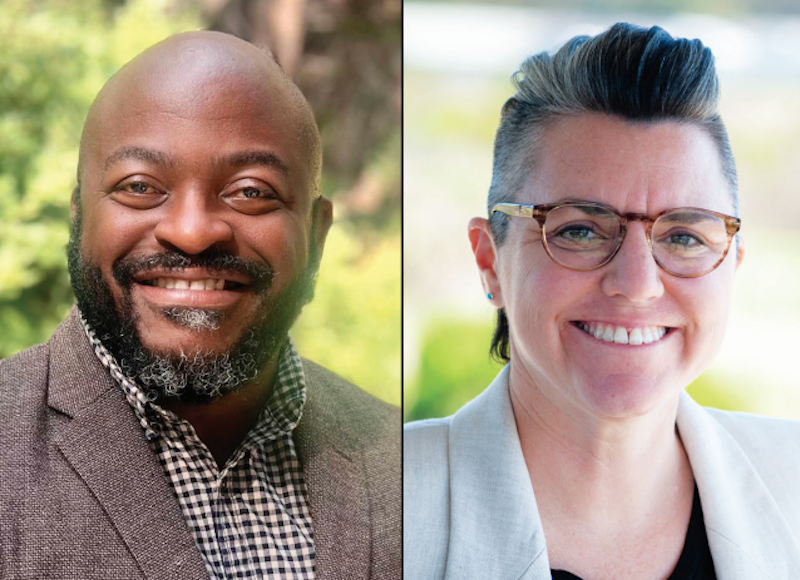Four people have filed their papers to run for the Fifth District Supervisor seat, which covers the county’s rural inland mountainous regions including Felton, Boulder Creek, Ben Lomond and Scotts Valley.
Two headed for the March 5 election are Christopher Bradford and Monica Martinez, both of whom say they were inspired to run after seeing the difficulties rebuilding after the CZU fires of 2020.
Monica Martinez
Monica Martinez has made public service her lifelong career.
When she came out as queer in the conservative California enclave of Bakersfield, where she was born and raised, she decided to enter the public service sphere.
“I felt what it was like to not have a voice,” she said. “From that point forward I really dedicated my life to making sure that people who have been left behind and left out have a voice.”
If elected as the Fifth District supervisor, Martinez would be the first openly LGBTQ person to hold the seat and the first woman elected to serve the district.
Martinez lives in Felton, where she is raising two young children. Since 2014 she has served as CEO of Encompass Community Services—the county’s largest nonprofit—which offers a broad range of services such as housing, counseling and substance use recovery.
“I represent diverse voices who haven’t had a seat at the table for a very long time, if at all,” she said. “Not only that, I also bring deep experience in navigating the public sector, public service, public funding.”
Martinez said being displaced during the CZU fires—and seeing her neighbors struggling with rebuilding from that and the winter storms—cemented her desire to use her skills and experience to streamline county services.
“I’ve seen the challenges of the last two years first-hand, and I want to use my expertise in navigating public systems and using public funding to ensure that public funding gets in the hands of the people who need it most,” she said.
Martinez earned a B.A. in Political Science at Cal Poly, San Luis Obispo, and a Master’s in Public Administration at University of Southern California.
She began her career working with women experiencing homelessness in Los Angeles’s Skid Row, a 54-block area known for widespread poverty and homelessness.
It was there she first saw the inner workings of the public system, and learned to treat people with respect and dignity, despite often bleak conditions.
“I’ve never been one to shy away from a hard challenge,” she said.
At Encompass, Martinez co-founded the 180/180 Initiative, which housed 180 homeless people in less than two years. She also scored a $9.4 million state grant to develop a new behavioral health campus in South County.
Martinez said she would work to address the ongoing effects of climate change, an issue tied inextricably to disaster preparedness.
“We need to do our part to prepare ourselves for those types of disasters locally and become more resilient in the face of climate change, and also invest in long-term projects to prevent the impact of climate change,” she said.
This would likely involve reimagining the county’s finances, she said.
“The county budget is a reflection of its values,” she said. “So if our county truly believes in being more environmentally friendly and reducing the impact of greenhouse gasses, then where we spend our dollars needs to reflect that.”
Martinez also said that the lack of affordable housing should be a priority, particularly workforce housing for teachers, firefighters and other essential workers so they can afford to live here.
“There is a real risk that we will lose the fabric of our community if housing prices continue to rise and wages don’t keep up with them,” she said.
Christopher Bradford
Christopher Bradford, who lives in San Lorenzo Valley with his family, said his experience losing his home in the CZU fires—and the difficulties he had in rebuilding—catalyzed his decision to run for the Fifth District seat.
“I experienced what it’s like when you need county government to be there for you, and it isn’t,” he said.
Bradford also said he was beset by hard-to-find and inaccurate information from the county, and often instead relied on neighbors and nonprofits in the wake of the fires.
“It opened my eyes to how important good representation is, and how important things like socio-economic diversity is,” he said. “I wanted to make sure that the person in the seat has the perspective of what the working person experiences in the county and understands what’s important for us going forward.”
Bradford serves as treasurer for Fire Safe Santa Cruz, a nonprofit that educates and encourages wildfire safety measures.
He currently works as Senior Technical Expert at Chegg, Inc., which provides services for students.
He is also co-owner of Dream Home Images, a real estate photography company.
Knowing his children will likely be unable to navigate the county’s expensive housing market, Bradford said he would look to ease the way for tiny homes, ADUs and workforce housing.
The alternative, he said, is people either commuting long distances to live here or moving to less expensive climes.
“That’s devastating for our community,” he said. “We’re going to keep losing successive generations who move elsewhere to start their lives because folks can’t afford to buy out here.”
Part of this, he said, comes from the “no-build” culture that has dominated development over the past three decades.
The solution, then, is to remove as many barriers as possible, beginning with a cultural shift in the planning department.
“We need to get away from the default of looking for a no,” he said. “Folks need to default to finding a yes when it comes to building.”
This includes easing rules for tiny homes, such as the requirement that they be placed on a foundation and must include sprinklers.
“We should be challenging people and saying ‘hey, our neighborhoods look best with people in them,’” he said. “And if we’re innovative we can find a middle ground that satisfies the housing needs and also respects the concerns people have about preserving character.”
Bradford would also look to improve communications infrastructure in the rural parts of the county.
“What we need is a supervisor and a government in place that is ready to act and is ready to move forward and get these things going,” he said. “We don’t have time to just talk about these things any more.”











